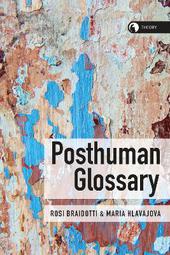
|
Posthuman Glossary
Hardback
Main Details
Description
If art, science, and the humanities have shared one thing, it was their common engagement with constructions and representations of the human at the centre of their respective realms. Under the pressure of new contemporary concerns, however, we are experiencing a "posthuman condition"; the combination of new developments-such as the neoliberal economics of global capitalism, migration, technological advances, environmental destruction on a mass scale, the perpetual war on terror and extensive security systems, to name but a few significant markers of our time- with a troublesome reiteration of old, unresolved problems that mean the concept of the human as we had previously known it has undergone dramatic transformations. Posthuman Glossary is a volume providing an outline of the critical terms of posthumanity in present-day artistic and intellectual work. It builds on the broad thematic topics of Anthropocene/Capitalocene, eco-sophies, digital activism, algorithmic cultures and security and the inhuman. It outlines potential artistic, intellectual, and activist itineraries of working through the complex reality of the 'posthuman condition', and attempts to create an understanding of the altered meanings of art vis-a-vis critical present-day developments. It aims to bridge multiple missing links across disciplines, terminologies, constituencies and critical communities. A completely original work which will unlock the terms of the posthuman for students and researchers alike.
Author Biography
Rosi Braidotti is a Philosopher and Distinguished University Professor at Utrecht University as well as director of the Centre for the Humanities in Utrecht, The Netherlands. Maria Hlavajova is artistic director BAK, basis voor actuele kunst, Utrecht, The Netherlands.
ReviewsThe essays, like the field itself, are diverse in scope, style, and difficulty ... [The] breadth of concepts and topics covered renders this volume, itself part of a series on emerging critical theories, useful in a broad range of academic disciplines. Summing Up: Highly recommended. Upper-division undergraduates through faculty. * CHOICE * Explicitly political through the network it draws together. Its tentacles spread far and wide, raise relevant questions and provide timely ideas on how to re-think affinities and practices. * Anarchist Studies * With Posthuman Glossary, editors Rosi Braidotti and Maria Hlavajova bring together a comprehensive and diverse range of entries that make an emphatic intervention in posthuman scholarship, offering neat summaries, exploring new applications and challenges and suggesting intriguing conceptual networks. The product of significant, collective intellectual and adminstrative labour, this ensemble piece will be a catalyst for research, activism and the formation of new ethical communities. * LSE Review of Books * While many academic dictionaries and glossaries offer little of substance or original content, Posthuman Glossary bucks that trend and provides instead a compelling and rewarding compendium. * The Year's Work in Critical and Cultural Theory * Moving from one entry to the next or following affective or theoretical threads by engaging in the conceptual paths mapped across the book, the reader will travel the creative and vibrant seas of posthumanist thinking, bursting with new concepts and ideas. This transdisciplinary venture provides essential tools for those who want to contest their anthropocentric, humanistic thinking and tackle the challenges of our unprecedented troubled times. It is a necessary task. -- Christine Daigle, Director, Posthumanism Research Institute and Professor of Philosophy, Brock University, Canada Whatever one's previous experience with posthumanism might be, the book's cumulative bibliography is indeed a gold mine. All the references made by the different authors can be found at the end of the book, and this provides the reader with the most complete bibliography of posthumanism and new materialisms. * Ethical Perspectives *
|